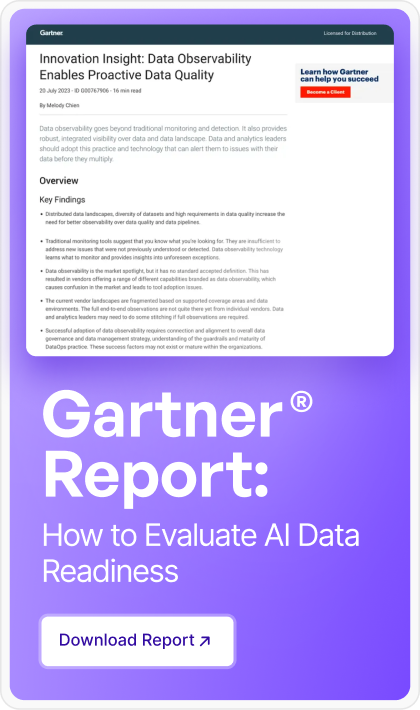In 2022, Unity Technologies lost $110 million in revenue after a bad dataset skewed its ad monetization algorithm, leading to incorrect payouts and broken partner trust. The platform had dashboards. It had alerts. But it lacked one critical piece: a system that could think.
Imagine being able to predict these failures before they happen, optimize operations with pinpoint precision, and make strategic decisions with complete confidence. This isn't science fiction. It's the reality for organizations with robust data artificial intelligence platforms.
Highly data-driven organizations are more likely to report significant improvements in decision-making compared to competitors who rely less on data. The message is clear: unifying data for more intelligent decision-making isn't just an IT initiative. It's a business imperative that directly impacts the bottom line.
What is a Data Intelligence Platform?
An intelligent data management platform connects the dots across your ecosystem: data pipelines, data warehouses, catalogs, policies, and people. But it does more than just centralize visibility; it enables actionable intelligence.
Today's most advanced systems are built on agentic AI: multiple specialized agents that continuously monitor, reason, and recommend actions across quality, governance, cost, and performance. Each agent improves with use. Together, they form a self-improving, enterprise-aligned intelligence layer over your data stack.
It's the difference between knowing there's a fire and having a system that predicts where it'll start, how to contain it, and what business loss it could cause.
Need for Unified Data Intelligence
The digital universe is expanding at a staggering rate. According to IDC research, the global datasphere will grow from 33 zettabytes in 2018 to a mind-boggling 175 zettabytes by the end of 2025 (Source: IDC). To put that in perspective, if you stored 175 zettabytes on Blu-ray discs, you'd have a stack that could reach the moon 23 times.
Why existing Tools Fall Short
Data remains fragmented across systems, departments, and platforms in most organizations. This fragmentation creates business challenges that directly impact performance and competitive advantage.
The leap isn't incremental. It's architectural. Traditional data management approaches have treated different aspects of the data lifecycle as separate concerns:
- One solution for data quality.
- Another for data catalogs.
- Another for pipeline monitoring.
- Yet another for cost optimization.
The result? Limited visibility, inconsistent governance, disconnected insights, and countless missed opportunities to transform data into business value.
Key Components of a Modern Data Intelligence Platform
Gone are the days when organizations could succeed with basic data warehousing and analytics tools. Today's environment demands more sophisticated, intelligent, and integrated data management strategies.
Data intelligence engine
At the heart of any effective data intelligence platform lies its brain: an AI-powered system that understands the unique characteristics of your organization's data landscape. This intelligence engine doesn't just process information; it transforms it into actionable insights by:
- Recognizing patterns and relationships across disparate data assets.
- Identifying optimization opportunities automatically.
- Learning from user interactions to continuously improve recommendations.
- Providing natural language interfaces that make data accessible to everyone.
Unlike basic analytics tools that report what happened, a true data intelligence engine understands the semantics of your data, not just its structure, enabling it to provide context, meaning, and predictive capabilities.
Enterprise Data Needs Memory, Not Just Metrics
Data decisions aren't made in isolation. A change in one pipeline affects reporting, and a broken catalog entry affects compliance. Without a system that remembers how things went wrong, you're doomed to repeat them.
That's why agentic platforms embed reasoning memory: a shared layer that stores decisions, consequences, and fixes across agents. Over time, the system becomes better at prioritizing what matters most to your business, not just flagging every red dot.
Unified data foundation
Modern enterprises generate and consume data in countless formats from various sources. A unified data observability foundation brings order to this chaos by integrating:
This unification creates a single source of truth that powers all data-driven initiatives across the organization, eliminating inconsistencies and enabling cross-functional insights that would otherwise remain hidden in isolated data silos.
Intelligent governance
Data governance has evolved far beyond mere compliance in today's regulatory environment. It's about creating an environment where data can be trusted, found, and utilized effectively while maintaining appropriate controls. Modern data intelligence platforms implement:
- Automated data quality monitoring and remediation that ensures accuracy.
- Comprehensive metadata management and data catalogs for discoverability.
- Fine-grained access controls and policy enforcement for security.
- Auditing capabilities that ensure regulatory compliance and data lineage.
Business Impact of Data Intelligence Platforms
Implementing a data intelligence platform isn't just about having better technology. It's about driving tangible business outcomes directly impacting growth, efficiency, and competitive advantage.
Enhanced decision-making velocity
Today, the speed of decision-making often determines market leadership. Organizations using unified AI data platforms significantly reduce their time-to-insight compared to traditional approaches. This acceleration comes from eliminating data silos, streamlining data preparation workflows, and providing business users with powerful self-service analytics capabilities.
Data management professionals spend most of their time on data preparation rather than analytics that drives business value. By automating and streamlining these processes, data intelligence platforms free up valuable technical resources to focus on innovation rather than maintenance.
Use case: Reducing Revenue Loss in real-time
Imagine a global retailer experiencing a sudden drop in online conversions. Traditional systems might point to slow page loads. But an agentic data management platform would go deeper:
- The quality agent detects inconsistent pricing data across regions.
- The pipeline agent detects a recent schema change from the marketing data source.
- The governance agent flags that this schema wasn't covered in any approved policy.
- The system links all of this to past incidents, recalls how it was fixed, and recommends a rollback and governance update.
No Slack war rooms. No week-long root cause hunts. Just answers and action.
Cross-functional data democratization
One of the most powerful impacts of AI intelligent data platforms is breaking down the traditional walls between technical and business teams. These platforms transform how organizations interact with their data by providing:
- Natural language interfaces that eliminate technical barriers.
- Simplified discovery mechanisms that make finding relevant data intuitive.
- Business-relevant context that connects data to actual business outcomes.
- Self-service analytics that reduce dependency on technical resources.
This democratization makes data accessible to data scientists, marketing managers, and executive leadership, creating a truly data-driven culture throughout the organization.
Real-world Applications of Data Intelligence Platform
Data intelligence platforms are transforming operations across industries by unifying disparate data sources and extracting actionable insights that drive business value.
Financial services: Unified customer intelligence
The financial services industry deals with some of the world's most complex and regulated data environments. A global banking organization implementing a data intelligence platform would gain a comprehensive view of customer relationships across retail banking, wealth management, and investment services. This unified approach enables:
- Real-time fraud detection systems that significantly reduce financial losses.
- Hyper-personalized product recommendations that increase cross-selling by understanding customer needs.
- Automated data compliance monitoring that prevents regulatory penalties and ensures data security.
- 360-degree customer views that improve service quality and relationship management.
Healthcare: Integrated patient insights
Healthcare organizations face unique challenges in connecting clinical, operational, and financial data to improve outcomes. Data intelligence platforms help these organizations by:
- Deploying predictive models that identify at-risk patients to reduce hospital readmissions.
- Optimizing resource allocation to improve operating room utilization and staff scheduling.
- Integrating billing and clinical data systems to reduce claim denials and improve the revenue cycle.
- Analyzing treatment patterns to enhance quality of care and patient satisfaction.
Retail: Omnichannel excellence
Providing seamless customer experiences across channels is essential in today's retail market. Retail chains using data intelligence platforms to unify e-commerce, in-store, and supply chain data gain powerful capabilities such as:
- Dynamic inventory management systems that reduce stockouts while minimizing carrying costs.
- Personalized marketing campaigns that deliver significant improvements in conversion rates.
- Advanced demand forecasting that optimizes procurement costs and reduces waste.
- Customer journey analytics that enhance the shopping experience across all touchpoints.
Acceldata: Leading the Shift Toward Agentic Data Intelligence
Acceldata is more than a data observability tool. It's a multi-agent, autonomous data management system with each agent designed for a specific problem, all working together.
You don't just get anomaly detection. You get:
- Quality agents that suggest context-aware remediation.
- Governance agents that auto-adjust policies based on usage.
- Pipeline agents that preemptively flag downstream risks.
- Cost agents that optimize spend based on access patterns.
- A reasoning engine that ties all of it together with institutional memory.Acceldata doesn't just monitor your data. It thinks alongside you.
Accelerating your Data Intelligence Journey
While the potential benefits of data intelligence platforms are substantial, the journey toward implementation shouldn't be underestimated. Most organizations face significant challenges in several key areas:
- Complex data integration across legacy and modern systems.
- Establishing effective governance without stifling innovation.
- Driving cultural adoption and data literacy across the organization.
- Balancing immediate needs with long-term architectural vision.
If your teams are still reacting to issues after the damage is done, you're not managing data. You're firefighting.
An intelligent data management platform powered by agentic AI flips the script. It empowers teams with:
- Context-aware suggestions.
- Cross-system coordination.
- Self-improving agents.
- A shared memory that gets smarter every day.
That's the difference between having data and having decisions.
Acceldata: Transforming Raw Data into Strategic Intelligence
Acceldata's Agentic Data Management platform provides context-aware intelligence and autonomous capabilities to transform raw data into strategic advantage. From automatically detecting potential issues before they impact business operations to providing actionable insights that drive revenue growth, Acceldata empowers organizations to realize the full potential of their data assets.
Acceldata is how enterprise data thinks.
Ready to transform how your organization's data? Book a demo with Acceldata today to see how its unified platform can transform your data operations and accelerate your business outcomes.







.webp)







.webp)
.webp)


